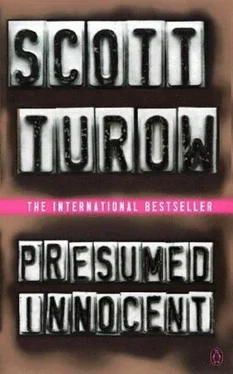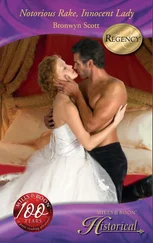Scott Turow - Presumed innocent
Здесь есть возможность читать онлайн «Scott Turow - Presumed innocent» весь текст электронной книги совершенно бесплатно (целиком полную версию без сокращений). В некоторых случаях можно слушать аудио, скачать через торрент в формате fb2 и присутствует краткое содержание. Жанр: Детектив, на английском языке. Описание произведения, (предисловие) а так же отзывы посетителей доступны на портале библиотеки ЛибКат.
- Название:Presumed innocent
- Автор:
- Жанр:
- Год:неизвестен
- ISBN:нет данных
- Рейтинг книги:4 / 5. Голосов: 1
-
Избранное:Добавить в избранное
- Отзывы:
-
Ваша оценка:
- 80
- 1
- 2
- 3
- 4
- 5
Presumed innocent: краткое содержание, описание и аннотация
Предлагаем к чтению аннотацию, описание, краткое содержание или предисловие (зависит от того, что написал сам автор книги «Presumed innocent»). Если вы не нашли необходимую информацию о книге — напишите в комментариях, мы постараемся отыскать её.
Presumed innocent — читать онлайн бесплатно полную книгу (весь текст) целиком
Ниже представлен текст книги, разбитый по страницам. Система сохранения места последней прочитанной страницы, позволяет с удобством читать онлайн бесплатно книгу «Presumed innocent», без необходимости каждый раз заново искать на чём Вы остановились. Поставьте закладку, и сможете в любой момент перейти на страницу, на которой закончили чтение.
Интервал:
Закладка:
Chapter 22
In the United States, the prosecution in a criminal case may not appeal the outcome. This is a constitutional principle, declared by the U.S. Supreme Court. An American prosecutor, alone among all the advocates who stand before the bench-among the sophisticates and hacks, the collection lawyers in their rayon suits, the bankruptcy moguls, the divorce-court screamers, the gold-chained dope lawyers or the smooth likes of Sandy Stern, the big-firm "litigators" who perform even routine courtroom tasks in pairs-the prosecutor alone is without right to seek review of a judge's trial rulings. Whatever the majesty of his office, the power of the policemen he commands, the bias in his favor jurors always bring to court, a prosecutor is often under a continuing duty to endure in silence various forms of judicial abuse.
Nowhere, while I was a P.A., was that obligation more regularly or onerously home than in the courtroom of Judge Larren Lyttle. He is sly and learned and indisposed by the experience of a lifetime to the state's point of view. The habits of twenty years as a defense lawyer, in which he regularly manhandled and belittled prosecutors and police, have never left him on the bench. And beyond that, he has a black man's authentic education in the countless ways that prosecutorial discretion can be used to arrogantly excuse unreasoning caprice. The random and complete injustices which he witnessed on the streets have become a kind of emotional encyclopedia for him, informing each decision that is made almost reflexively against the state. After two or three years, Raymond gave up coming to court to argue. The two of them would bellow at each other as they must have done in their old law office. Then Larren would bang his gavel, more adamant than ever, and declare a recess so that he and Raymond could make up back in chambers and plan to have a drink.
Judge Lyttle is on the bench, receiving status reports on other cases, when Stern and I arrive. It is always as if there is a spotlight. He is the only person you see-handsome, mercurial, extraordinarily prepossessing. Judge Lyttle is a big human being, six foot four or five and broad across. His first fame came as a football and basketball hero at the U., where he went on scholarship. He has a full head of medium-length African hair, most of it gone gray, a big face, enormous hands, a princely style of oratory, with a large voice, full across all the male ranges. His intelligence, which is mighty, is also somehow transmitted by his presence. Some say Larren sees his future on the federal bench; others guess that his real goal is to succeed Albright Williamson as the congressman from the district north of the river, whenever it is that Williamson ceases defying age and his cardiologist's predictions. Whatever his inclinations, Larren is someone whose prospects and personal powers make him in these parts a man of capital importance.
We were summoned here yesterday morning by a phone call from the judge's docket clerk. With the filing of the defendant's pre-trial motions two days ago, His Honor desires to hold a status hearing on my case. I suspect that he is going to rule on some of our requests, and perhaps discuss a trial date.
Sandy and I wait in silence. Kemp has stayed behind. The three of us spent yesterday together and I told them everything I knew about each witness Nico has listed for the case. Stern's questions remained precise and limited. He still did not ask me if I screwed Carolyn that night, or was there for any other reason, or whether, notwithstanding my prior proclamations, I own any instrument that might conform to the crack atop her head.
I spend these moments, familiar downtime in a Courtroom lawyer's life, looking about. The reporters are all here again, although the sketchers have stayed home.
Judge Lyttle, politic in the ways a judge can be, treats reporters well. There is a table set aside for them against the western wall and he always gives the press room a call before issuing any decision of import. The courtroom where the course of the rest of my life will be determined is a jewel. The jury box is set off by a walnut rail and descending baubles, round spheres of beautifully grained wood. The witness stand is similarly constructed and abuts the judge's bench, which is well elevated and covered by a walnut canopy supported by two red marble pillars. The docket clerk, the bailiff, and the court reporter (whose job is to write down every word spoken in open court) are in a well before the bench. A few feet in front of them, two tables have been placed, finely hewn, again in darker walnut, with carefully turned legs. These tables for the lawyers on trial sit perpendicular to the bench. The prosecution, by tradition, will sit nearer the jury.
When all the other business is finished, our case is called. Some of the reporters creep up to the defense table to better hear the proceedings, and the assembly of lawyers-and me-convene before the bench. Stern, Molto, and Nico state their names. Sandy notes my presence. Tommy shoots me a little grin. I bet he's heard about our meeting with Raymond last week. "Gentlemen," Judge Lyttle begins, "I asked you here because I thought we could do a little work to move this case along. I have some motions from the defendant and I'm prepared to rule on them, unless the prosecutors are particularly anxious to make a response."
Tommy speaks in Nico's ear.
"Only to the motion to disqualify Mr. Molto," Nico says.
Naturally, I think. An entire office working for him, and he's still gun-shy about putting things on paper.
Larren says that he will leave the motion to disqualify to the end, although he has some thoughts about it.
"Now the first motion," Larren says, with the stack of paper right before him, "is a motion to set an immediate trial date. And I've thought about this, and as the prosecutors know, the Rodriguez case pled earlier this morning, so I will be free for twelve trial days beginning three weeks from today." Larren looks to his calendar. "August 18. Mr. Stern, can you be here?"
This is an extraordinary development. We had expected nothing sooner than the fall. Sandy will have to set everything else aside-but he barely hesitates.
"With pleasure, Your Honor."
"And the prosecution?"
Nico at once begins to back and fill. He has a vacation planned. So does Mr. Molto. There is still evidence to be developed. With that, Vesuvius erupts.
"No, no," says Judge Lyttle, "I will hear none of that. No, sir, Mr. Delay Guardia." He pronounces Nico's name that way, as if he is trying to incorporate the nickname. With Larren, you can never tell. "These charges here-These charges are the most serious crime-What else could you do to Mr. Sabich? A prosecutor his entire professional life, and you bring charges like this. We all know why Mr. Stern wants a quick trial. There're no secrets here. We've all been tryin cases for a good part of our lives. Mr. Stern has looked at the evidence you have provided by way of discovery, Mr. Delay Guardia, and he doesn't think you have much of a case. He may not be right. I wouldn't know about that. But if you come into this courtroom chargin a man with a crime, you better be ready to prove it. Right now. Don't be tellin me about what's going to develop. You can't leave this hangin over Mr. Sabich like that old sword of Damocles. No, sir," Larren says again. "We're gonna have a trial three weeks from today."
My blood is ice. Without excusing myself, I take a seat at the head of the defense table. Stern glances back momentarily and seems to smile.
"Now, what else have we got?" says Larren. Just for an instant, as he looks about, there is a private smile. He can never quite hide his satisfaction with himself for trashing a prosecutor. He passes quickly on our motions for production. Every one is granted, as they should be. Tommy complains a little bit about the motion to produce the glass. He reminds the court that the prosecution has the burden of proving a chain of custody-that is, that the glass was never out of the state's hands-an impossibility if the glass is turned over to the defense.
Читать дальшеИнтервал:
Закладка:
Похожие книги на «Presumed innocent»
Представляем Вашему вниманию похожие книги на «Presumed innocent» списком для выбора. Мы отобрали схожую по названию и смыслу литературу в надежде предоставить читателям больше вариантов отыскать новые, интересные, ещё непрочитанные произведения.
Обсуждение, отзывы о книге «Presumed innocent» и просто собственные мнения читателей. Оставьте ваши комментарии, напишите, что Вы думаете о произведении, его смысле или главных героях. Укажите что конкретно понравилось, а что нет, и почему Вы так считаете.












